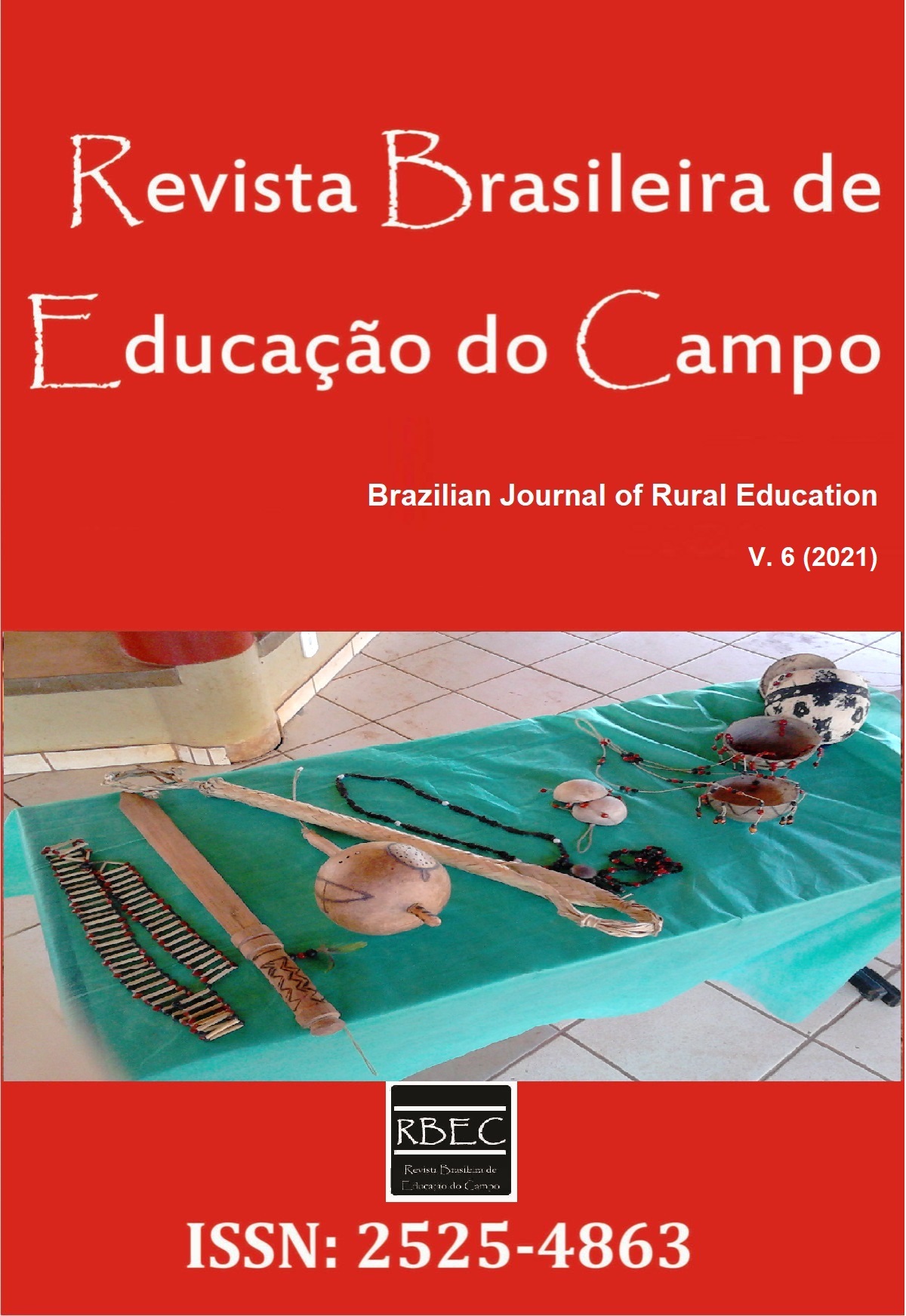Social voices, rural education and life projects: A dialogical analysis of practices at SERTA (Alternative Technology Service)
DOI:
https://doi.org/10.20873/uft.rbec.e10784Abstract
ABSTRACT. The main objective of this article is to understand the educational practices of Alternative Technology Service (SERTA), through the contributions of the Educational Support Program for Sustainable Development (PEADS) for the construction of students' Life Projects. Based on the Dialogic Discourse Analysis (DDA) of the Bakhtinian circle, it is intended to analyze, in what way and to what extent, the social voices that permeate the experienced activities are perceived in the statements of the subjects that permeate this educational space and contribute to your Life Projects. The results point to the PEADS methodology and Pedagogy of Alternation experienced in SERTA, as possibilities for individual and collective growth and contribute to the protagonism of the subjects, the awakening of the feeling of belonging to a social group, the motivation to learn, research and share the diverse knowledge that is learned in the course, either during the moments of immersion of school time (ST), or in the activities of community time (CT), by providing the opportunity for individual and collective listening and appreciation of the subjects throughout the entire educational process experienced in the Technical Course in Agroecology.
Downloads
Literaturhinweise
Arroyo, M. G., Caldart, R. S., & Molina, M. C. (Orgs.). (2004). Por uma Educação do Campo. Rio de Janeiro, RJ: Vozes.
Bakhtin, M. (V. N. Volochínov). (2004). Marxismo e Filosofia da Linguagem. (11ª Edição). São Paulo, SP: HUCITEC.
Barros, D. L. P., & Fiorin, J. L. (Orgs.). (2003). Dialogismo, Polifonia e Intertextualidade. São Paulo, SP: Editora da Universidade de São Paulo – EDUSPE.
Bauman, Z. (1997). Modernidade Líquida. Rio de Janeiro, RJ: Jorge Zahar Editora.
Bauman, Z. (2005). Vidas desperdiçadas. Rio de Janeiro, RJ: Jorge Zahar Editora.
Café, A. et al. (2007). Juventude do Campo e Educação: múltiplos olhares e possibilidades. In Rangel, A. C. (Org.). Políticas Públicas para a Juventude do Campo na Amazônia: direito nosso, dever do estado (s./p.). Belém, PA: [s.n.].
Caldart, R. (2004). A Escola do Campo em movimento. In Arroyo, M. G., Caldart, R. S., & Molina, M. C. (Orgs.). Por uma Educação do Campo (s./p.). Petrópolis, RJ: Vozes.
Dayrell, J. F. (1999). Juventude, Grupos de Estilo e Identidade. Educação em Revista, 30, 25-39.
Dayrell, J. T., & Gomes, N. L. (2004). A juventude no Brasil. Belo Horizonte, MG: Mimeo.
Fernandes, B. M., & Molina, M. C. (2004). O campo da Educação do Campo. In Molina, M. C., & Jesus, M. S. (Orgs.). Por Uma Educação do Campo: Contribuições para a Construção de um Projeto de Educação do campo (pp. 32-53). Brasília, DF: Ministério do Desenvolvimento Agrário.
Furlani, D. D., & Bonfim, Z. A. C. (2013). Jovens de ambiente rural e urbano e sua relação com projetos de vida. In Leite, J. F., & Dimenstein, M. (Orgs.). Psicologia e Contextos Rurais (pp. 117-142). Natal, RN: Editora da UFRN – EDUFRN.
Moura, A. (2015). Uma Filosofia da Educação do Campo que faz a diferença para o Campo. Recife, PE: Editora Via Design Publicações.
Oliveira Jr. O., & Prado, M. A. M. (2013). ________. In Leite, J. F., & Dimenstein, M. (Orgs.). Psicologia e Contextos rurais (pp. 57-88). Natal, RN: Editora da UFRN – EDUFRN.
Santos, C. E. F., Paludo, C., & Oliveira, R. B. C. (2010). Concepção de Educação do Campo. In Taffarel, C. N. Z., Santos Júnior, C. L., & Escobar, M. O. (Orgs.). Cadernos didáticos sobre Educação no Campo (s./p.). Salvador, BA: Universidade Federal da Bahia.
Wanderley, M. N. B. (2013). Juventude Rural: vida no campo e projetos para o futuro. Recife, PE: Editora UFRPE.
Veröffentlicht
Zitationsvorschlag
Ausgabe
Rubrik
Lizenz
Creative Commons Attribution License
Creative Commons Attribution License
Proposal for Copyright Notice Creative Commons
1. Policy Proposal to Open Access Journals
Authors who publish with this journal agree to the following terms:
A. Authors retain copyright and grant the journal right of first publication with the work simultaneously licensed under the Creative Commons Attribution License that allows sharing the work with recognition of its initial publication in this journal.
B. Authors are able to take on additional contracts separately, non-exclusive distribution of the version of the paper published in this journal (ex .: publish in institutional repository or as a book), with an acknowledgment of its initial publication in this journal.
C. Authors are permitted and encouraged to post their work online (eg .: in institutional repositories or on their website) at any point before or during the editorial process, as it can lead to productive exchanges, as well as increase the impact and the citation of published work (See the Effect of Open Access).














